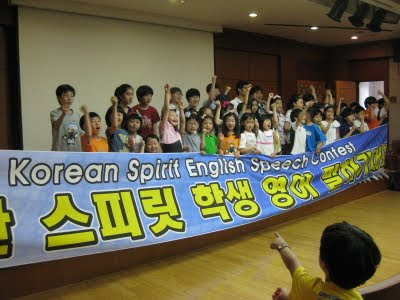Below is a list of the ten things I most appreciate about South Korea at this point in time (in no particular order):
1. Noraebangs (Singing rooms): I love singing, but was always intimidated by singing Karaoke at a bar. The music tracks at Noraebangs are much easier to sing along to and the small rooms provide enough intimacy to make almost anyone comfortable with giving singing a go. And you can sing whatever you want (I think so anyway). Picture me singing "You spin me right round, baby right round" by myself on my birthday. If this makes you sad for me, don't be. I was having the time of my life! :)
2. Saunas/spas: There's something great about being able to shower, bathe, go in different saunas, sleep and relax all you want all for about $10. My favorite spa is one in Seoul called Spa Lei. It's a women's-only spa, with wonderful white robes instead of the short sets you get at other Korean saunas.
3. Fast service and delicious and healthy food: I keep looking for the button to push on the table when I'm at a restaurant. I was shy to use this at first in Korea (it's like a doorbell that customers use to call the servers), but I really miss it now. Nothing like asking for and getting what you want quickly and efficiently, with hardly any lines or waiting. I have to remind myself to be patient again when I am waiting in lines in Canada.
I also gained an appreciation for "food as medicine" in Korea. I wasn't always able to practice this in Korea as much as I wanted to, but I have definitely made a commitment to eating more healthy food now that I am home and I'm not necessarily being pressured to eat something. I am a much better eater after going to Korea. My mom would be proud.
I recently read a book called the "5-Factor World Diet" and South Korea was included in it as one of the countries' traditional diets from whom we in North America could learn a lot. The picture below shows banchan (side dishes, like tapas, that are usually served before a meal). According to the book, eating side dishes like these helps to slow down eating and reduce portion size, particularly when you're using chopsticks (although I never really saw anyone eating slowly or in a small way in Korea...there's the food--go! ;). Also these side dishes help to ensure that there is a variety of tastes, including sweet, sour, bitter, salty, and spicy (the five-flavor approach often used in Chinese, Japanese, and Korean cooking). The picture above is of a savory pancake-like dish made with buckwheat and scallions. The red fermented dish is kimchi and the other side dishes are mushrooms, black soy beans, some soy sauce for the pancake, and some kind of seaweed (I still don't eat seaweed yet so I'm not familiar with the different kinds).
4. Eclecticism: There's a great mix of old and new, of history and modernity, of different styles and ideas being tried on. When people try something on in South Korea, they really try it on. I admired this passion. I guess this is true of many places around the world, but it seemed like there was a focus on promoting old and new and everything mixed in between and that really struck me.
5. Healthy skin and a sense of style and focus on appearance: There are drawbacks to this, of course, like not feeling like you can go out when your hair is all messed up and you are wearing your oldest and most comfy sweatpants. But, there was something about people's concern for their appearance and health that I liked. It made me take care of myself better.
6. Broadband speed and Wifi: Everywhere you go you can access wifi, even in the subway, and...it's fast (like most things in Korea).
7. Safety: I rarely felt unsafe. Maybe this is because there are usually so many people everywhere you go. Also, I could easily tell where and when it was safe to walk by myself. My laptop was stolen from my one-room apartment, and then safely returned in the wee hours of the next morning (through the gaps in the bars of my window while I was sleeping--see picture below). I'm not sure why it was returned--maybe because it had an English O/S and couldn't be sold on the black market? But, regardless, I was happy to have my laptop with all of my PhD data and research on it back. Some people also suggested it spoke to the "honesty" of the thief who stole it.
8. The sea and the mountains: Love having both so close to each other.
9. Public transportation: Reasonable, clean, and efficient. I especially loved the Express Buses, taxis (the ones with the friendly drivers), and subway system in Seoul. Having travelled back and forth from Cheonan to Seoul often, I spent a lot of time on them and really miss this level of efficiency and how reasonable public transit was there.
10. The smiles and passion: This helped me somehow feel at home in South Korea. There's always something happening and people doing it with passion and an openness to trying new things and to change. I appreciated all of the smiles I received and people's intent to connect, which I could sense, even though they might have been too scared to actually talk to me because they thought I was going to speak to them in English.
Goodbye and thank-you, South Korea, and all those I met and who touched my life. Until we meet again! :)































































